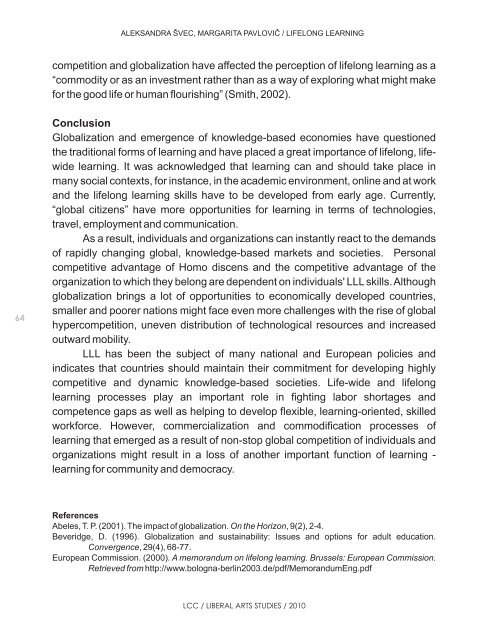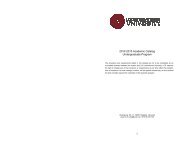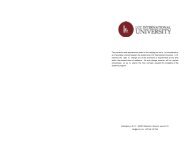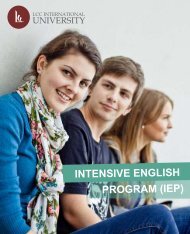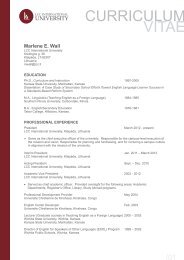lcc liberal arts studies / 2010 volume iii - LCC International University
lcc liberal arts studies / 2010 volume iii - LCC International University
lcc liberal arts studies / 2010 volume iii - LCC International University
Create successful ePaper yourself
Turn your PDF publications into a flip-book with our unique Google optimized e-Paper software.
64<br />
ALEKSANDRA ÐVEC, MARGARITA PAVLOVIÈ / LIFELONG LEARNING<br />
competition and globalization have affected the perception of lifelong learning as a<br />
“commodity or as an investment rather than as a way of exploring what might make<br />
for the good life or human flourishing” (Smith, 2002).<br />
Conclusion<br />
Globalization and emergence of knowledge-based economies have questioned<br />
the traditional forms of learning and have placed a great importance of lifelong, lifewide<br />
learning. It was acknowledged that learning can and should take place in<br />
many social contexts, for instance, in the academic environment, online and at work<br />
and the lifelong learning skills have to be developed from early age. Currently,<br />
“global citizens” have more opportunities for learning in terms of technologies,<br />
travel, employment and communication.<br />
As a result, individuals and organizations can instantly react to the demands<br />
of rapidly changing global, knowledge-based markets and societies. Personal<br />
competitive advantage of Homo discens and the competitive advantage of the<br />
organization to which they belong are dependent on individuals' LLL skills. Although<br />
globalization brings a lot of opportunities to economically developed countries,<br />
smaller and poorer nations might face even more challenges with the rise of global<br />
hypercompetition, uneven distribution of technological resources and increased<br />
outward mobility.<br />
LLL has been the subject of many national and European policies and<br />
indicates that countries should maintain their commitment for developing highly<br />
competitive and dynamic knowledge-based societies. Life-wide and lifelong<br />
learning processes play an important role in fighting labor shortages and<br />
competence gaps as well as helping to develop flexible, learning-oriented, skilled<br />
workforce. However, commercialization and commodification processes of<br />
learning that emerged as a result of non-stop global competition of individuals and<br />
organizations might result in a loss of another important function of learning -<br />
learning for community and democracy.<br />
References<br />
Abeles, T. P. (2001). The impact of globalization. On the Horizon, 9(2), 2-4.<br />
Beveridge, D. (1996). Globalization and sustainability: Issues and options for adult education.<br />
Convergence, 29(4), 68-77.<br />
European Commission. (2000). A memorandum on lifelong learning. Brussels: European Commission.<br />
Retrieved from http://www.bologna-berlin2003.de/pdf/MemorandumEng.pdf<br />
<strong>LCC</strong> / LIBERAL ARTS STUDIES / <strong>2010</strong>


